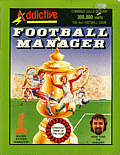
































Football Manager

Football Manager is the first game in the Football Manager series. Kevin Toms developed the first game, which was text-only, on a Video Genie, a clone of the Tandy TRS-80. The title evolved out of a board game Toms first designed aged 11 that was itself inspired by the 1968 football management simulation board game Soccerama. Early iterations were modelled on the cardboard from cereal packets and blank card decks, but Toms was inspired to develop it into a computer game after purchasing a ZX81 and deciding this was a 'much better tool to run the game on, especially for automating things like the league table calculations and fixtures'.
It was later converted to the Sinclair ZX80 and ZX81, and Toms created the software label Addictive Games to launch the game in 1982. It was then ported to the ZX Spectrum with added animated graphics showing match highlights.
The game was a huge success and was ported to a wide range of systems between 1984 and 1987. While the Amiga, Amstrad CPC, Atari ST, BBC Micro, Commodore 64, MSX and DOS versions, kept or improved all features such as the match highlights graphics, all others (including the Acorn Electron, Atari 8-bit Commodore 16 and Plus/4 were, like the original, text only.
The game was written entirely in BASIC and, apart from the match highlights on some versions, used only text displays and keyboard entry. The player chooses a team and then must try to earn promotion from the fourth to the first division (although the player can then keep playing for as many seasons as they wish). The player also competes in the FA Cup. While the team and player names are real, they are not accurately represented so whichever team is selected, the player always starts in the fourth division and their team is randomly populated with players. Each player has a skill rating and an energy rating. Players must be rested to renew their energy rating or they become injured. The players' skill and energy ratings also change at the end of the season. The team has ratings of defence, midfield and attack (the total skills of all defenders, midfielders or attackers selected), energy (an average of all selected players) and morale (which increases when the team wins and decreases when they lose). The player can select their team to balance the skills based on the opposing team's ratings (e.g. to increase the defence rating if the opposition has a high attack rating).
As the match is played, the screen is updated if a goal is scored. For versions with animated graphics highlights, attempts on goal are shown in isometric 3D at either end of the pitch with a scoreboard showing the current score. The player can not affect the game while it is in progress.
The player must also balance finances. Weekly income and expenditure is calculated and bank loans can be taken out. There is also a basic player transfer system. Random players become available to buy which the player can bid for. If the squad reaches the maximum of 16, no players will be available to buy. The player can also list their own players for sale and then accept or reject bids.
Game progress can be saved at any time. A customiser utility was included with the game so players could rename the teams and players.
How to play:
Click on the joystick icon in the Football Manager online emulator to see how to control the Football Manager game









































Comments